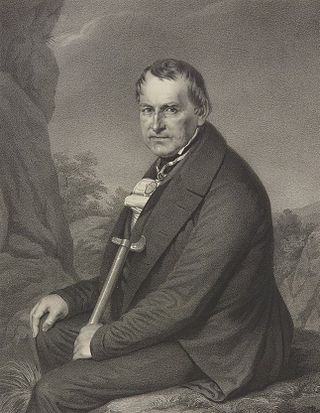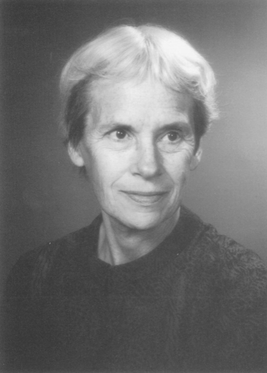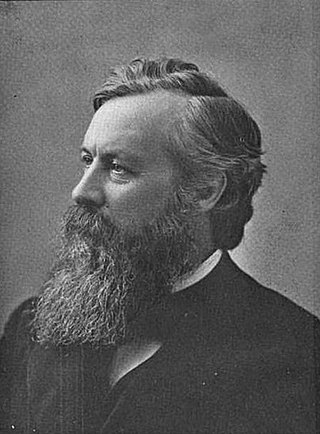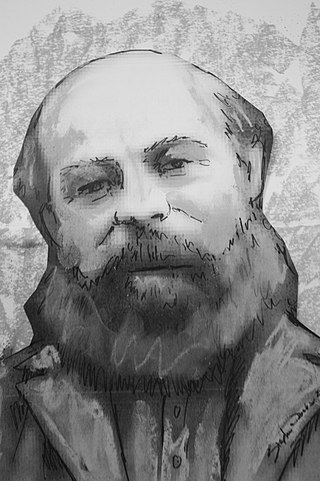
William Cullen was a Scottish physician, chemist and agriculturalist, and professor at the Edinburgh Medical School. Cullen was a central figure in the Scottish Enlightenment: He was David Hume's physician, and was friends with Joseph Black, Henry Home, Adam Ferguson, John Millar, and Adam Smith, among others.

Sir Roderick Impey Murchison, 1st Baronet, was a Scottish geologist who served as director-general of the British Geological Survey from 1855 until his death in 1871. He is noted for investigating and describing the Silurian, Devonian and Permian systems.

The Geological Society of London, known commonly as the Geological Society, is a learned society based in the United Kingdom. It is the oldest national geological society in the world and the largest in Europe, with more than 12,000 Fellows.

Christian Leopold von Buch, usually cited as Leopold von Buch, was a German geologist and paleontologist born in Stolpe an der Oder and is remembered as one of the most important contributors to geology in the first half of the nineteenth century. His scientific interest was devoted to a broad spectrum of geological topics: volcanism, petrology, fossils, stratigraphy and mountain formation. His most remembered accomplishment is the scientific definition of the Jurassic system.

Robert Jameson FRS FRSE was a Scottish naturalist and mineralogist.

Sir Archibald Geikie was a Scottish geologist and writer.

Henry Darwin RogersFRS FRSE LLD was an American geologist. His book, The Geology of Pennsylvania: A Government Survey (1858), was regarded as one of the most important publications on American geology issued up to that point.
Alexander Rose of Edinburgh was a wood and ivory turner, following in the footsteps of his father, John, who came from Cromarty. He developed an interest in minerals and began a mineral collection, becoming a dealer in minerals. He later became a lecturer in geology and mineralogy at Queen's College, Edinburgh and was eventually nominated as a Fellow of the Royal Scottish Academy.

The Edinburgh Phrenological Society was founded in 1820 by George Combe, an Edinburgh lawyer, with his physician brother Andrew Combe. The Edinburgh Society was the first and foremost phrenology grouping in Great Britain; more than forty phrenological societies followed in other parts of the British Isles. The Society's influence was greatest over its first two decades but declined in the 1840s; the final meeting was recorded in 1870.
John R. Underhill is Professor of Stratigraphy and Director of the Centre for Energy Transition at Aberdeen University, Scotland. He was a football referee in the Scottish Premier League, until mandatory age retiral in 2008 and was on the FIFA panel of referees.

The Plinian Society was a club at the University of Edinburgh for students interested in natural history. It was founded in 1823. Several of its members went on to have prominent careers, most notably Charles Darwin who announced his first scientific discoveries at the society.

Janet Vida Watson FRS FGS (1923–1985) was a British geologist. She was a professor of Geology at Imperial College, a rapporteur for the International Geological Correlation Program (IGCP) (1977–1982) and a vice president of the Royal Society (1983–1984). In 1982 she was elected president of the Geological Society of London, the first woman to occupy that position. She is well known for her contribution to the understanding of the Lewisian complex and as an author and co-author of several books including Beginning Geology and Introduction to Geology.
Edward Howel Francis, BSc, DSc, FRSE, FGS was a British geologist and Emeritus Professor of Earth Sciences at the University of Leeds. He was President of the Geological Society of London from 1980 to 1982.
Douglas Alexander Allan, CBE, FRSGS, FRSE, FMA was a geologist and curator, eventually becoming the director of the Royal Scottish Museum in Edinburgh, from 1945 until 1961.

David Milne-Home of Milne Graden FRSE FGS PGSE LLD (1805–1890) was a Scottish advocate, geologist and meteorologist. He was the founder of the Scottish Meteorological Society in 1855, and served as its chairman. From 1874 to 1889 he served as president of the Edinburgh Geological Society

Alexander Winchell was a United States geologist who contributed to this field mainly as an educator and a popular lecturer and author. His views on evolution aroused controversy among his contemporaries; today the racism of these views is more cause for comment.

Charles Thomas Clough MA, LLD, FGS, FRSE was a prominent British geologist and mapmaker. The Edinburgh Geological Society named the Clough Medal in his honour.

The Geological Society of Glasgow is a scientific society devoted to the study of geology in Scotland.
Lieutenant-Colonel Ninian Imrie of Denmuir was a Scottish army officer and geologist. He gave the first wholly geological description of the Rock of Gibraltar. He stirred the Plutonist versus Neptunist debate during the Scottish Enlightenment.
Ralph Richardson WS FRSE FRSGS FEGS was a Scottish lawyer and noted amateur geologist and historian.














